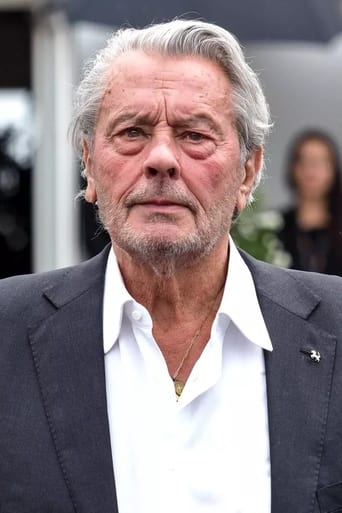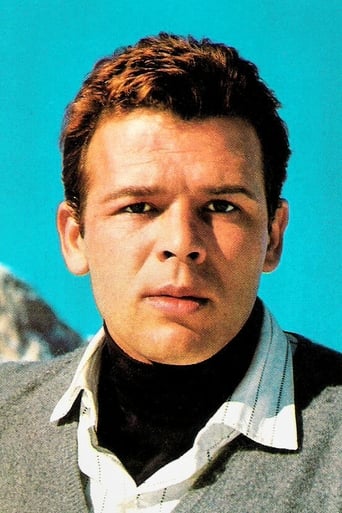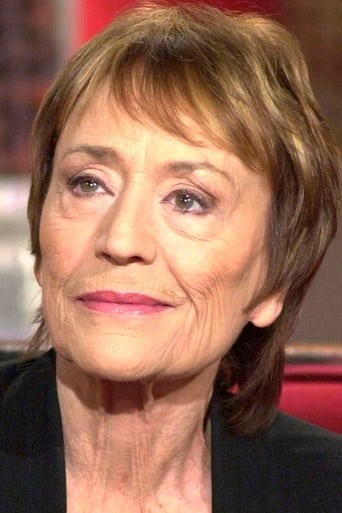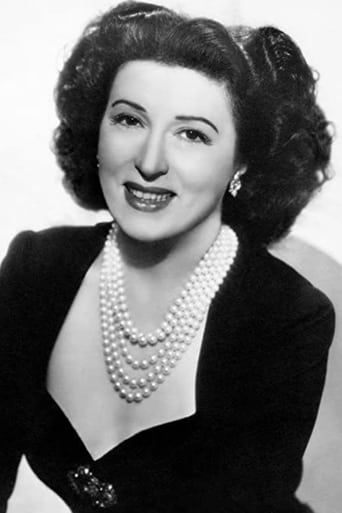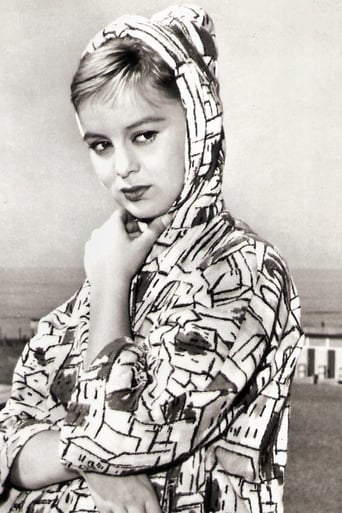Grimerlana
Plenty to Like, Plenty to Dislike
Merolliv
I really wanted to like this movie. I feel terribly cynical trashing it, and that's why I'm giving it a middling 5. Actually, I'm giving it a 5 because there were some superb performances.
Aiden Melton
The storyline feels a little thin and moth-eaten in parts but this sequel is plenty of fun.
Bob
This is one of the best movies I’ve seen in a very long time. You have to go and see this on the big screen.
kijii
Although I've seen several Visconti films, this is my favorite. In some ways it reminds me of Raging Bull made twenty years later. This is partially due to its story about the rise and fall of a boxer and partially due to its broad view of the boxer's personal life and volatile relationships. Also, both films display stunningly black and white photography. Although Raging Bull was a epic biopic about an actual boxer, it's hard to believe that a film historian like Martin Scorsese wasn't heavily influenced by Rocco and His Brothers when he made Raging Bull.This film also reminds me a bit of grand opera (without the music). It is pregnant with dramatic human emotions such as love, hate, jealousy, revenge, murder, and remorse. THIS beautiful 'opera' is in five 'acts,' each named for one of the five Parondi brothers: (Act 1) Vincenzo, (Act 2) Simone, (Act 3) Rocco, (Act 4) Ciro, and (Act 5) Luca. The five 'acts' of the three-hour movie aren't, in any way, short stories or vignettes exclusive to the character named: the entire movie is about all of them and always within a family context. However, the film sections (named after the brothers) tend to give the audience some structural clues about how the characters evolve, with each taking on more prominent roles at different times in the story.Greek actress Katina Paxinou, who had won the Best Supporting Actress Oscar in 1943 as a Spanish freedom fighter in For Whom the Bell Tolls and played in several Greek tragedies, seems equally at home here as the quintessentially volatile Italian mother, Rosaria Parondi. After her husband's accidental death, she fulfills her lifelong dream of moving from the country in the South of Italy to the big city of Milan. This is where she always dreamed of living, and this is where she believes her sons can make successes of their lives.As Rosaria and four of her sons arrive in Milan on the train, their eyes are full of hope and excitement for the future. They expect to be greeted by the fifth and eldest son, Vincenzo (Spiros Focás), but he is not there. When they trace him down, he is celebrating his upcoming marriage with his fiancee's family. When his own large family arrives on the doorstep of the party, his plans suddenly change. His new priority is to help his family get settled in Milan.Rosaria and her sons take a house and start looking for work. Almost instantly God provides them with a snowstorm, and the four oldest brothers take to the streets to shovel snow for startup money. While Vincenzo already has a job in housing construction, Simone (Renato Salvatori) looks for a future as a prizefighter and falls in love with a loose but cute and outgoing girl, Nadia (Annie Girardot). When Simone's trainer becomes concerned about his lifestyle, he calls his brother, Rocco (Alain Delon), into his office and asks him to look out for Simone —watching to see that he stays away from drinking, smoking, and the wrong kind of company. Although the Parondi family is very close, friction develops between Simone and Rocco when Simone's boxing career starts to take a tumble, and Rocco is asked to take his place. As Simone's life and career gradually slide, that of the idealistic Rocco succeeds. Rocco knows that Nadia is a troubled girl, from a troubled home, and that she has a prison record. She had openly told him about these things before. He feels sorry for her and wants her to be happy. Simone takes Rocco's friendship and concern for Nadia as love, and this, coupled with the two brothers' reversal of fortune, makes Simone jealous of him. This comes to a head when, Simone and his gang follow Rocco and Nadia into a dark field one night. There, as Simone's gang holds Rocco back, Simone rapes Nadia in front of him. He then tries to further humiliate him by drawing him into a fight. Unable to fight his brother, Rocco is badly beaten and left lying in the gutter. Not wanting to worry his mother, and with no where else to go, he stays with Vincenzo and his wife for the night. Ciro is the steady brother who works as a technician in an Alfa Romero factory and plans to get married soon. In the Ciro section of the film, we learn that Simone's life continues on a downward spiral as he moves into his mother's house with his 'whore,' Nadia. When his debts become overwhelming, Rocco is forced to sign a long- term fighting contract as the only way to get Simone totally out of debt. Ciro serves as a go- between for his two estranged brothers---one too hard and the other too idealistic. The final portion of the film is the Luca section. It serves as something of a summary—a coda--for the entire Parondi family epic. This section compares what life was in the country and what it had become in the city. Although Ciro tries to guide the youngest brother, Luca (Rocco Vidolazzi), back to the country before it is too late; before his life is too settled; and while he can still change; he wants Luca to understand the past, what is important and what isn't. To Crio, Luca represents the family's future.
MisterWhiplash
Perhaps the greatest (or just only) neo-realistic soap opera? Neopra! Actually, it's operatic quality is what is great for it, and you can either dig into it or you can't. I did, but it takes some adjusting from those earlier neo-realistic scenes in the movie. It's like a fusion of Visconti's more grounded, Earthy material in his 1947 film La Terra Trema and the intense passion of his other more "actual" operatic movies like The Leopard and Senso, and the tragic dimensions (if not the restraint) of The White Nights.It has it all, though it's not a perfect film. It's messy and is so into its Italian-dramatic states that you can almost feel the theater shake with the vibrations of the Brothers' Mother crying and screaming. But it's got intense passion and is true to its high-stakes emotional nature. Only a few scenes really stand out as dated. Its violence is also quite vivid for a movie 50 years old; it got censored pretty much everywhere on original release, and the print I saw by chance at a revival house was "Presented" by Martin Scorsese. So it goes. Oh, and Alain Delon is wonderful, in case you were wondering.
Cosmoeticadotcom
Aside from its great portrayal of family life (and, via Rocco, all the hypocrisies and evils therein), the film is also great study in the effects of World War Two on rejiggering the Italian lifestyle, especially with expanded urbanization. In the end, the three older brothers cannot deal with the move from the pastoral life of their youth. Ciro, who is easily the most ethically grounded brother (despite Rocco's constantly being called saintly), can do so, and the film ends with the jury out on young Luca. This is heightened by the fact that we are not shown any images, within the film, of the family's rural roots- not domestic nor geographic. It, as the past always is, is another country. But, many poor critics have mistakenly called the film a 'tragedy,' when it clearly is not, for a tragedy demands a sense of grandeur or greatness, and there are no such people in this film. Instead, Rocco And His Brothers shows us dirt poor 'real' people scraping to survive (in stark contrast to Visconti's campier melodramas on the rich and powerful), and one of the consequences of survival is that only the fittest make it. Thus, Nadia, Simone, and one suspects Rocco, are doomed. But this fact is far more related to the film's Neo-Realist roots than its melodramatic faux 'tragedy.' And that all this is done so deftly, with an economy of narrative setup, is a testament to both the writing and acting in selling what could be a really bad cliché.Rocco And His Brothers is a great film, which only deepens upon successive viewings (in meaning and complexity) just as its nominal successor (Hannah And Her Sisters) was a quarter century later, but for the same reason, achieved by different means: it takes one into another (past) time and era seamlessly- making any inquiry into what mis-en-scene is seem silly; and in doing so proves it is timeless. And that is usually never too far from greatness.
Armand
I am a fan of Visconti movies. for the Barroco nuances and poetry of small things. for beauty of details and courage to present slices of a neorealism in which is mixed nostalgic crumbs of a world fall and need of new society definition. Rocco was first movie by him who I saw it. a film - bitter story. picture of a family, map of searches, touching drawing of a victory of city and the love as delicate web. and, sure, one of wonderful roles of Alain Delon. in fact, a gate, or only a window to a time who becomes ours. because story is universal. and the figure of poor mother - letter of a never ending poem , is remarkable. end of an age. seed of a new form of self definition for Italian cinema. but, very important, testimony, not about a period. but a state of soul. must see it !

